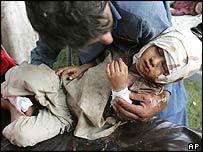FIGHTING FOR SURVIVAL
 When a disaster takes place somewhere in the world, the aid industry shifts into high gear.
When a disaster takes place somewhere in the world, the aid industry shifts into high gear.
I use the word industry on purpose.
Since the South Asian earthquake struck the newsdesk has been indundated with press releases from charities offering interviews with their spokespeople, trips on their aid flights and filming opportunities at their projects.
Every single one of these organisations is doing vital, life-saving work.
But one thing I've learned through my involvement with MAG is that the voluntary sector is a cut-throat world and charities are as focused on financial considerations as they are on humanitarian ones.
It's a simple equation. Media coverage + increased visability = more donations.
The days of the good intentioned amateur are over -- and the corporatisation of good causes upsets people like former Greenpeace activist John Castel.
At its best, this more businesslike approach can tap into new sources of funding which can be used to save more lives.
But as the Red cross recently noted in its annual Disasters Report, at its worst it can lead to turf wars between rival agencies, with charities failing to communicate, duplicating effort and competing for profile -- all while people around them die.
 When a disaster takes place somewhere in the world, the aid industry shifts into high gear.
When a disaster takes place somewhere in the world, the aid industry shifts into high gear.I use the word industry on purpose.
Since the South Asian earthquake struck the newsdesk has been indundated with press releases from charities offering interviews with their spokespeople, trips on their aid flights and filming opportunities at their projects.
Every single one of these organisations is doing vital, life-saving work.
But one thing I've learned through my involvement with MAG is that the voluntary sector is a cut-throat world and charities are as focused on financial considerations as they are on humanitarian ones.
It's a simple equation. Media coverage + increased visability = more donations.
The days of the good intentioned amateur are over -- and the corporatisation of good causes upsets people like former Greenpeace activist John Castel.
At its best, this more businesslike approach can tap into new sources of funding which can be used to save more lives.
But as the Red cross recently noted in its annual Disasters Report, at its worst it can lead to turf wars between rival agencies, with charities failing to communicate, duplicating effort and competing for profile -- all while people around them die.

1 Comments:
Hi. I've posted a link to this comment and your website on my blog. Hope this is fine with you.
Xenmate
Post a Comment
<< Home